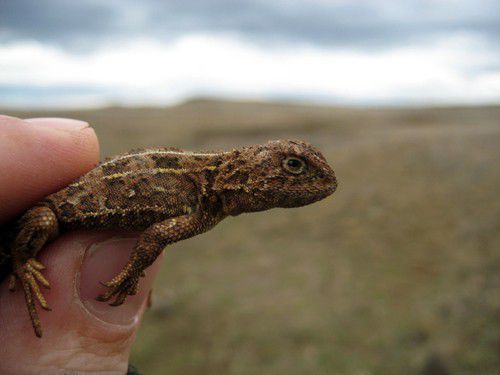A PROGRAM that is breeding the endangered Grassland Earless Dragon could bring the species back from the brink.
Dr Lisa Doucette from the University of Canberra’s Institute for Applied Ecology says that during the 2004-2007 drought, dragon populations in the ACT and NSW crashed to critically low numbers and the species faced a real threat of imminent local extinction.
“The species is only found in a handful of locations in the ACT and NSW and is dependent on high quality native grassland – one of the most threatened ecosystems in Australia,” Lisa said.
“Dragons require very specific habitat conditions to live and breed successfully.
“Climate change will likely result in a greater frequency of hot days, and the risk is that dragons will be unable to adequately feed as they spend more time avoiding the heat in refuges and may not survive drier conditions as vegetation cover is reduced.
“The University, in partnership with the ACT Government, has established a captive colony of this species at the University of Canberra – the only one of its type in Australia.”
“The goal of having a captive research population is to learn how to successfully breed and maintain the Dragons in captivity as an insurance against losing the species, such as during severe drought,” said ACT Government Senior Ecologist, Dr Murray Evans.
“Grassland Earless Dragons are short-lived and require quite specific environmental conditions to reproduce, making the captive breeding program challenging.”
“Project funding will help to produce a best practice manual for captive breeding and release of the dragons, taking into account our changing climate.
“The work is part of a broader program to restore ACT native grasslands through the use offire, strategic grazing, and the reintroduction of rocks in areas where they have been removed, to improve habitat for a wide range of grassland fauna species.
“We want to improve the dragon’s resilience by providing more varied and high quality habitat, to help dragons cope with higher temperatures and drought,” said Dr Evans.
For more information visit environment.act.gov.au
Who can be trusted?
In a world of spin and confusion, there’s never been a more important time to support independent journalism in Canberra.
If you trust our work online and want to enforce the power of independent voices, I invite you to make a small contribution.
Every dollar of support is invested back into our journalism to help keep citynews.com.au strong and free.
Thank you,
Ian Meikle, editor





Leave a Reply